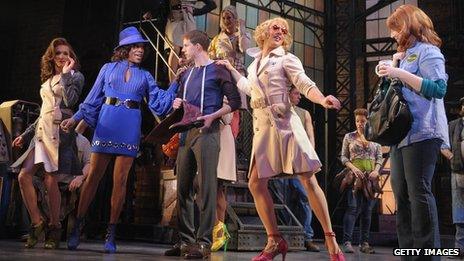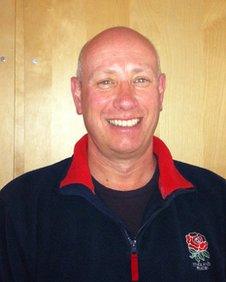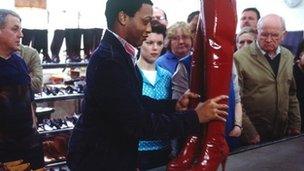Kinky Boots inspiration comes out of the shadows
- Published

The Kinky Boots Broadway show was the big winner at this year's Tonys, bagging six awards
A BBC documentary about a struggling Northamptonshire shoe factory caught the attention of film-makers and in 2005 became the film Kinky Boots. Now in New York the stage version has won the Tony award for Best Musical. What has made the story travel with such success from Earls Barton to Broadway?
Steve Pateman clearly recalls the moment he realised the TV documentary in which he had featured was a hit with viewers.
"On the day it went out the BBC brought me down to London to do a couple of interviews. The next day I was on the tube rushing for my train back to Northamptonshire when a guy recognised me and leant over to talk about the programme. Soon half the carriage was on about it. That's when I knew it had gripped people."
Kinky Boots won best musical, best original score for its writer - 80s pop star Cyndi Lauper - and best leading man
Trouble at the Top: The Kinky Boot Factory was broadcast in February 1999. If people tuned in for the sexy title they kept watching because of an engrossing human story.
In his 30s Pateman had taken over from his father as boss of WJ Brookes - a traditional shoe factory in the village of Earls Barton in Northamptonshire which had existed for more than a century.
Struggling with changes in fashion and competition from abroad Steve had started to look for new markets. He was persuaded by an unexpected phone-call to think about expansion into "kinky boots" - women's shoes in men's sizes for transgender people.
The call came from Sue Sheppard, who owned a business in Folkestone selling transgender specialist glamour wear. Lacies is still there today. Sheppard - who was born Anthony - could never have imagined what would flow from that call.
"At first Steve was a bit baffled at what I was suggesting he might supply," she remembers. "He made it very clear his firm had spent a century making men's shoes and that stilettos and thigh-boots just weren't their thing.

Steve Pateman would like to be involved if the stage show transfers to the UK
"But I explained we were having real difficulty getting hold of well-made women's shoes which would fit men. I persuaded him the market wasn't as niche as he thought and suddenly he was keen.
"In fact at one point Steve got carried away. He was talking about leopard-skin boots and other exotic lines. But what my customers want is classic black patent boots and shoes which will take a man's weight."
The original TV programme documented Steve's energetic and good-humoured attempts to move into a market he had barely heard of before Sue Sheppard's call.
Today he has scrapbooks filled with some of the publicity which ensued. "We had people phoning up from all over the country wishing us well as I tried to keep the company afloat. Time and again people told me how their own business had been through the same tough times."
"In fact only a few years before we'd been doing really well - in the 1980s there'd been record profits. But we were basically an export business - 90% of what we sold went to Germany and in the 1990s exchange rates were killing us."
When 18 months after the original programme the BBC came to update the documentary it was to record the factory's closure. For a time Steve struggled on as a mail-order business but that too folded. The factory was sold off for housing and now Steve works as a full-time firefighter.
When more than a decade ago he was approached to turn the story into a film he was surprised but delighted. "I realised the story was likely to change for the screen - and it did. The big invention was the character Lola who didn't exist in real life."
Screen to stage
Lola is a black drag queen who educates "Charlie Price" (as he's called in the screenplay) in transgender culture. "Lola was a combination of eight or 10 different people I met along the way.

The 2005 Kinky Boots film starred Chiwetel Ejiofor as Lola
But the whole tone of the film changed hugely in development: scripts and writers came and went and for a long time I didn't really think it would get made.
Pateman says it was the same when he heard there was a musical in the offing in New York.
"Unlike with the film there's no payment involved although it's still basically my story - and at first I doubted the stage show would ever happen anyway. I've learnt enough about show business to know that most ideas never come to fruition.
"But when last year I saw it was opening on Broadway I contacted the PR people and told them I was the original Kinky Boots man. I asked if they were interested in getting me over as part of the publicity but nothing ever happened which is a bit disappointing.
"With the recent success the show's now likely to come to London so I'd love to be involved then.
"So far I've only seen a few clips online. They've made a few changes of course but it's still set in Northampton which I imagine is a first for Broadway. But I think the appeal of the story has never changed anyway, all the way back to the original documentary.
"The film had a glamour which wasn't exactly how things were. And from the little I've seen of the Broadway musical they've gone to the max on that, as you'd expect.
"But what people love is the warmth of the relationships in the factory, which was always a sort of family. It's very British - but the echoes are there are for industries around the world as small manufacturing firms face a big struggle to survive."
- Published10 June 2013